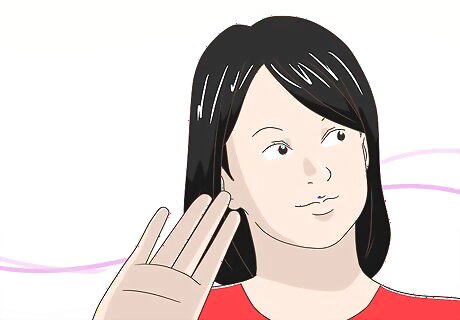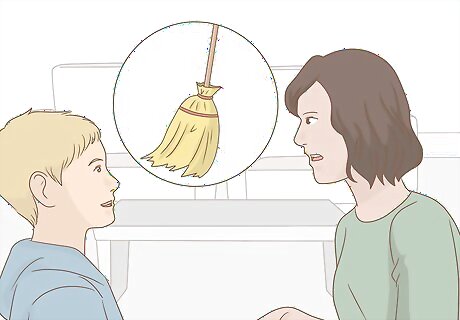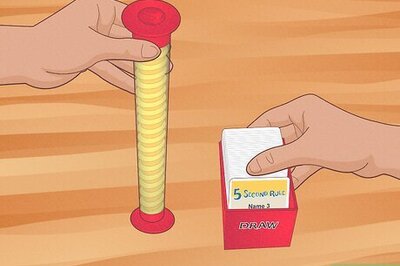
views
Developing Coping Mechanisms

Talk to a trustworthy friend or family member. Sometimes just talking to someone about what you are dealing with can make you feel better. Try talking to a trustworthy friend or family member about what has been happening in your home life. For example, you could try talking with a close friend about the way that your parents make you feel. Choose someone you feel comfortable talking to and who you know will not turn around and repeat what you said to your parents. Try to avoid becoming too dependent on this person for your emotional needs. Just talk when you need someone to listen to you. If you find yourself calling several times a day for reassurance, then you may be developing a codependent relationship with this person. Talk to your school counselor or therapist if you find yourself depending more and more on other people for validation.

Find a mentor. Mentors can guide you through important life decisions and teach you things that your parents are not willing or able to teach you. You can find a mentor to help you learn new skills for navigating difficult situations, succeeding in school, or advancing your professional career. Try asking a trustworthy, responsible adult in your life to mentor you, such as a coach, a teacher, or a boss. If your coach or boss offers to mentor you, make sure that you take him or her up on that offer; however, you can also try asking someone to mentor you, such as by saying, “I admire your success in life and I hope to achieve many of the same things you have someday. I am not sure how to get there. Would you be willing to mentor me?” Try to avoid becoming too dependent on your mentor(s). Keep in mind that a mentor cannot replace your parents. You should not look to this person for parental guidance. A mentor is just someone who can help you reach your goals in school, work, or in another specific area of your life.

Seek help from a therapist or school counselor. Learning to cope with your parents’ behavior can be difficult, so you may need to seek help from a therapist or school counselor. A therapist or your school counselor can help you to develop coping mechanisms and begin to feel better about yourself. If your school has a counselor, stop by and see if you can make an appointment to talk. If you feel uncomfortable doing this or you're not sure how to go about it, talk to a teacher you trust. You may also try asking your counselor if you can see a therapist by saying something like, “I have been struggling with some things lately, and I would like to see a therapist to talk about them. Can you help me find one?” Keep in mind that if your parents are abusing you, then your therapist or school counselor will be required to report it.

Resist comparing how they treat you and your siblings. If your parents seem to favor a sibling over you, it doesn’t mean they love one of you any more or less. There could be a situational reason why they treat your sibling with more thoughtfulness or effort. Most of the time it is also unintentional, and your parents may not even realize they are treating you differently. Most aren’t trying to make you feel unloved but aren’t aware of how their actions affect kids mentally and emotionally. Try not to focus on how your parents treat your siblings. Instead, just focus on your relationship with them

Try not to take it personally. It can be hard to dismiss criticism and hurtful language from people who are supposed to love you, even if you know that what they are saying isn’t true. Remember that your parents’ behavior and words is about them and not about you. The next time one of your parents says something mean or does something to hurt you, try telling yourself, “I am a good person who is lovable, beautiful and worthy. My parents are just struggling with personal issues and that is why they said/did that.”

Be kind to yourself. Some children who are mistreated by their parents treat themselves badly as well, such as by cutting, using alcohol or drugs, or intentionally failing at school. Performing these unhealthy, harmful activities will not make you feel better in the long run. Instead of doing these things, make sure that you nurture yourself, such as by: Maintaining a healthy diet. Exercising moderately most days of the week. Starting a daily meditation practice. Not smoking and not using drugs or alcohol.

Replace negative self-talk with self-love. People who grow up in unloving households may be more prone to negative self-talk and have low self-esteem. To train your mind to think positive things about yourself, replace the negative thoughts with positive ones. For example, if you hear yourself repeating something your parents said like “You’re stupid if you can’t figure out division problems,” you might replace it with: “Learning long division is challenging, but I can succeed by working hard at it. I can also ask my math teacher for help."

Write yourself a positivity cheat sheet. It may help you to examine any negative thoughts that are interfering with your ability to love yourself and write some positive thoughts to replace them. To get started, make a chart with four columns. In the first column, make a list of your negative beliefs. These might include things like, “I am not good at making decisions,” or, “I am not very smart.” In the second, explain why you believe these things. Did your parents tell you these things or do things to cause you to feel this way? In the third column, think about what believing this is costing you emotionally and in your personal life: are you depressed, withdrawn, afraid to try new things and fail, afraid to trust others or let people in, etc.? List briefly but specifically what you are missing out on by letting yourself continue believing this negative self-image. Then for the final column, rewrite the thought to make it positive. For example, you might change a thought about your intelligence to something like, “I am an intelligent, capable person and I have accomplished many things using my brain.”

Get out of the house more. Developing a happy, full life outside of your home will help you to feel happier even if your home life is not happy. Finding valuable ways that you can contribute to the world while being an active part of your community can help you rebuild your self-worth and confidence by focusing your attention on your well-being and happiness. Try volunteering for a local non-profit organization, getting a job that you will enjoy, or joining a youth organization or sports team.
Staying Healthy and Safe

Report any physical or sexual abuse. If you are being abused, then seek help right away. Talk to a teacher, your doctor, a counselor, or call the police or children’s services and ask for help. Chronic abuse gets harder to recover from the longer it goes on. Don’t allow abusive people, even family, to cause you permanent physical or emotional damage. Get away from them as soon as possible. Call the National Domestic Violence Hotline at (800) 799-SAFE to talk about your situation and options. Don't hesitate to dial 911 if you think you or another family member is in immediate danger. You aren’t going to get in trouble for reporting that someone else is breaking the law!

Sever your relationship, if possible. If you are able to break ties with your abusive parent, do so. It is hard to give up on anyone you care about, especially family, but your primary responsibility is to take care of yourself. Don’t feel guilty for severing contact with your parent(s) if you feel it’s the best thing for you. If you are not sure cutting off all contact is necessary, consider the amount of pain they cause you vs. the amount of happiness. Dysfunctional parents may show love sometimes, typically when it serves their own interests, but a little love now and then isn’t enough to justify staying in a bad relationship with anyone.

Resist the urge to isolate yourself from peers and other adults. You might think avoiding relationships altogether will prevent you from getting hurt any more or by anyone else, but human beings need social relationships to thrive. Children who grow up without a loving parent or an alternative parental figure are less successful, less happy, and physically sicker as adults. Keep talking to your friends and other family members regularly, go spend time with them whenever possible, and be open to meeting new friends and trustworthy adults. Not every adult or loved one will end up treating you like your parent does. Don’t be afraid to give others a chance to love you. Long-term loneliness can have serious health effects, worsening or even maybe causing diseases like diabetes, heart disease, and neurological disorders. It may even cause cancer to spread faster.

Learn how to be independent. If your dysfunctional parents aren’t teaching you how to make it on your own after high school, ask another adult you trust how to prepare for the "real world." Learn this like how to create a budget, how to do laundry, how to turn on the water heater in your first apartment. Estimate the costs of independent living and what you will need to get started. Get a job and save up money for a security deposit on your first apartment and some furniture. Maintain good grades despite trouble at home so you have the option of going to college. Ask your school counselor to help you find scholarships to pay for it.
Recognizing Toxic Parents

Consider how your parents respond to your accomplishments. One sign of a toxic parent-child relationship is if your parents do not acknowledge your accomplishments in appropriate ways. This could mean that your parents either refuse to acknowledge when you accomplish something, or that your parents dismiss your accomplishments. Some parents may even ridicule your accomplishments. For example, if you get a good grade on a test, your parents should congratulate you for this accomplishment. If your parents are toxic, then they might ignore what you said, change the subject, make fun of you for being a nerd, or say something like, “So what? It’s just a test.”

Think about any controlling behaviors that your parents use. It is normal for parents to want to guide you, but parents who try to control your behavior may be toxic. This may range from small decisions like what to wear to school to larger decisions like where to go to college or what to major in. If you think that your parents exert a high amount of control over your decisions, then they may be toxic. For example, a parent who encourages you to make your own decisions might ask you questions about where you want to go to college and why; however, a parent who is exerting control over your decisions might tell you where you are going to attend college.

Note a lack of emotional connection. Parents who have healthy relationships with their children show their emotional bond by making eye contact with their children, smiling at them, and offering affection in the form of hugs. If your parents have toxic behaviors, then they might not do any of these things. For example, a parent who shows appropriate emotional connection with his child might comfort her if she is crying; however, a parent who lacks an emotional connection with his child might ignore the child or yell at her to stop crying.

Consider the boundaries between you and your parents. Healthy boundaries are important in parent-child relationships. If you have good boundaries with your parent, then you should not feel like your lives are one and the same. For example, a parent who has healthy boundaries with her child might ask how her child's friends are doing, but would not insist on hanging out with her child and his friends.

Reflect on any verbal abuse you have suffered. Verbal abuse is another form of toxic parenting. If your mother or father call you names, put you down, or just say things to hurt your feelings, then these are all forms of verbal abuse. For example, your parents should say things to build you up and make you feel good about yourself; however, you would feel bad if your parent said something like, “You’re worthless!” or, “I can’t stand to be in the same room with you!” Some parents will be kind and reassuring one day and then mean and critical the next day. But keep in mind that this is still verbal abuse, even if your parents are not always cruel to you.

Identify narcissistic behaviors. Parents who are too focused on themselves to notice their children or to treat them properly can also be toxic. If your parents ignore you completely or only acknowledge you when you are doing something that they can brag about to friends, then this is an example of narcissistic parenting and it is toxic. For example, your parents should encourage you in your interests. A narcissistic parent, however, might only pay attention to you if your interests give him something to brag about, such as by telling all of his friends that you won a scholarship, even though he never asks about your studies or encourages you. Some narcissistic parents may have a personality disorder (PD). A person with PD displays self-centeredness, refusal to accept personal responsibility, constant self-justification, a strong sense of entitlement, and shallow emotions. A parent with PD might treat children like a burden or roadblock to her own personal goals. She will typically rely on emotional manipulation to control her kids. People with PD are often hypercritical of their children and can be physically abusive or prone to endangering their child’s welfare.

Think about any parenting roles you played. Some parents are too immature or have other problems (such as addiction) that make it hard for them to be effective parents, so a child ends up taking on some parenting duties. Consider whether you had to take on any parenting roles because your parent was not able or willing to care for you and/or your siblings. These may include things like cooking, cleaning, and caring for other children. Sometimes parents assign cooking and cleaning chores to teach children responsibility, but toxic parents may heap many responsibilities on one child to avoid having to do these things themselves. For example, a toxic parent who does not want to cook or clean may shirk these responsibilities and force one of his children to do all of the cooking and cleaning instead.

Judge their behavior over what they say. Some children feel unloved even though their parents say that they love them regularly, because they don’t see this love reflected in how they are treated. Make sure you aren’t assuming you know how your parents feel about you without good reason. For example, a parent who regularly says “I love you,” but who often ignores her children is not behaving in a way that shows love. Likewise, a parent who says that she wants her children to be independent, but never allows them to make any decisions is not behaving in a way that demonstrates what she says she wants.


















Comments
0 comment